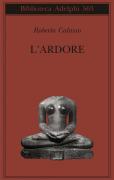L'Ardore

Something immensely remote from today appeared more than three thousand years ago in Northern India: the Vedas, a "knowledge" which included in itself everything, from grains of sand up to the boundaries of universe. Distance that is felt in the way we live every gesture, every word, every act. Vedics lent an adamantine attention to the mind that held them, never severable from that ' "ardor" from which they felt the world had developed itself. The moment acquired sense in relation to an invisible overflowing of divine presences. It was an experiment of thought so extreme that it could disappear without a trace of its passage in the "land where wanders freely the black antelope" (as it was defined the place of the law). Yet that thought - tangle composed of enigmatic hymns, ritual acts, stories of gods and metaphysical flashes - has the undeniable ability to illuminate with oblique light, different from any other, the elementary events that belong to the experience of everyone, now and everywhere, starting with the mere fact of being conscious. So colliding with many of what are now considered firm acquisitions. This book tells how through the "one hundred chimneys" alluding to the title of a huge and capital work of the Veda, the Sarapatha Brahmana, is it possible to reach what's in front of us going through what it's farther away from us.